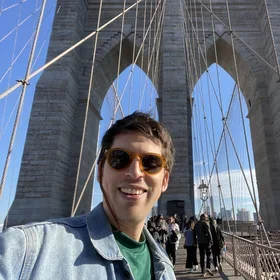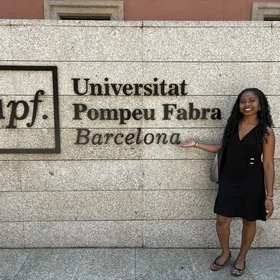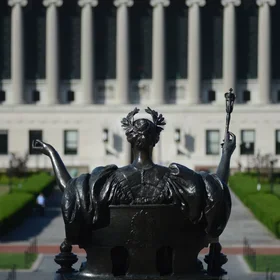“I could write a book on this question,” Jesse Gemberling-Johnson says about the similarities between the Marine Corps and human capital management.
Jesse is a father and husband, a working professional, a veteran, and a current student in Columbia University’s M.S. in Human Capital Management program. HCM students come from all walks of life and bring with them their own unique backgrounds, which Jesse says creates his ideal academic environment. His experiences in both the military and his civilian life, he says, have supplied him with the skills needed to bring people from different backgrounds together to work toward a common goal.
We spoke with Jesse about his passion for motivating others to reach their full potential, support structures for success, and his work with a nonprofit providing unique experiences for children with special needs.
Why did you choose the HCM program at Columbia?
I did a lot of research into HR-related master’s programs and the Columbia HCM program curriculum seemed most aligned with where I am in my career journey. I also chose the program because of the flexibility with format options. I live in Philadelphia, work full-time, have two young children, and run a nonprofit in my free time. I knew the only way I would be able to attend grad school at this stage in my life would be if the program was part-time, online, and at night–and this HCM program supported that.
What made you want to work in human capital management?
I’ve always loved seeing people grow into better versions of themselves. Sometimes that transformation comes from inside, and sometimes it is nurtured by their environment. I find purpose in doing my best to support the latter in both personal and professional relationships. I also see a lot of potential in people, and I’m intrinsically motivated to help them realize and showcase what they are capable of. I also love finding ways to leverage cognitive diversity. There is great value in finding effective ways to bring together people who think and problem-solve differently.
Could you tell us about your nonprofit?
I launched the East Coast operation of a nonprofit called “Fish for Life.” The mission is to bring dignity, inclusion, and new possibilities to children with special needs. We take 100 people out on a full-day fishing trip and there are 30 participants with special needs. It flips the narrative for kids feeling stigmatized in a "normal" activity setting. During these trips, they get support, encouragement, and congratulations. On almost every trip, each kid catches at least one fish. (On one trip someone caught 14!) Before going home, we have a medal ceremony where the kids and volunteers share the best stories from the day and then we have a "surprise" water gun fight. It’s a blast.
As a veteran, what skills from your time in the service do you find applicable to your studies of human capital management?
Service members join the military from all different ethnic, geographic, cultural, and socioeconomic backgrounds. They don’t pick their assignments nor their units. To translate that to the civilian workforce, imagine organizations and teams that have absolutely nothing in common. It’s a true test of leadership to have to motivate, incentivize, and get people to work together for a common mission that impacts everyone, especially when that mission could mean life or death. It’s the most extreme type of leadership and human capital strategy.
Veterans often find ways to optimize the output of individuals. My interest in this has extended well beyond my years of service as a Marine Officer.
What's something that might surprise people to know about human capital management?
People often think that others are born smart, talented, and with innate abilities that enable them to do incredible things. Though I’m not challenging the reality that people have personality traits or characteristics that might aid them in certain areas of life, those are far from the most prominent indicators of success. The truth is far more humbling (and empowering). The support structures and environments created for people to develop and succeed are far more accurate indicators of future potential and achievement. I see our studies in Human Capital Management as being directly tied to this objective and outcome.
About the Program
The Columbia University M.S. in Human Capital Management program prepares graduates to be world-class HCM strategists able to address changing needs in building and motivating talented, engaged workforces in the private, public, academic, and not-for-profit sectors. The program is available part-time, full-time, on-campus, and online.


